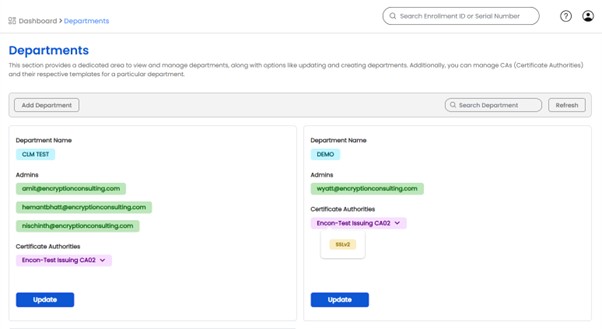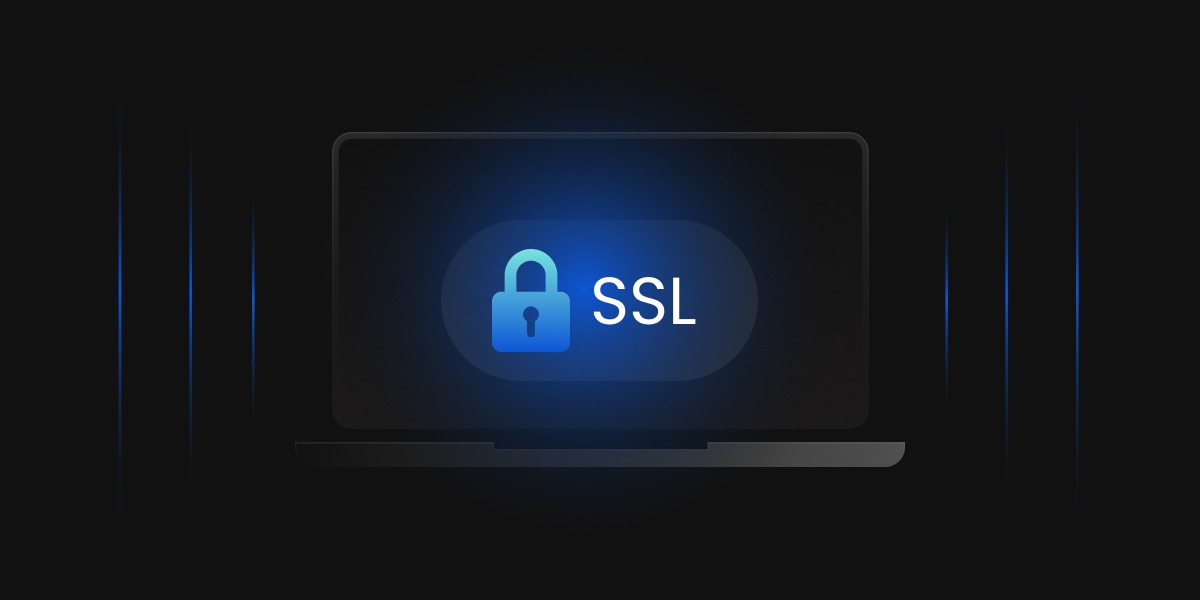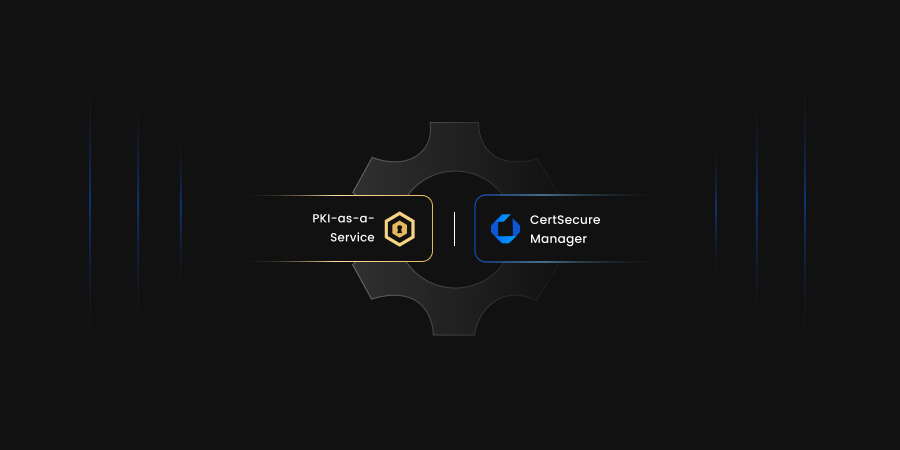Self-service capabilities in a Certificate Lifecycle Management (CLM) solution empower users and teams to manage their digital certificates more independently. This dramatically cuts down reliance on central IT or security teams and speeds up operations. In today’s dynamic, agile IT environments, especially with the surge in hybrid and multi-cloud infrastructures, quick access to certificates isn’t just convenient; it’s essential.
The “Why” Behind Self-Service CLM
Organizations face a significant challenge: as the demand for certificates explodes, security and operations teams often have limited resources. Manually managing certificate requests, issuance, provisioning, and renewal across diverse teams and timelines becomes an overwhelming burden. This results in time-consuming processes and significant inefficiencies in the CLM process.
Beyond inefficiency, there’s a critical security risk. When delays occur, teams might bypass established procedures. They may obtain certificates from unauthorized Certificate Authorities (CAs) or use self-signed certificates that don’t comply with security policies. These “shadow IT” certificates often go unnoticed, leaving security teams unaware of potential vulnerabilities, outages, and compliance issues. Self-service CLM directly addresses these pain points, improving efficiency and bolstering security.
CertSecure Manager: Enabling Secure Self-Service at Scale
CertSecure Manager, developed by Encryption Consulting, is a modern CLM platform built to reduce manual overhead, eliminate certificate sprawl, and enforce enterprise-grade security policies. A key pillar of CertSecure Manager is its self-service framework, which empowers users—developers, DevOps teams, and application owners—to manage certificate operations on their own, within a secure, policy-governed environment.
By enabling decentralized teams to request, renew, and manage certificates independently, CertSecure Manager helps reduce turnaround time, lower the burden on central security teams, and ensure consistent compliance across environments.
Key Self-Service Capabilities of CertSecure Manager
CertSecure Manager’s self-service capabilities are built around a highly granular and customizable framework, allowing organizations to:
- Create and Manage Distinct Departments or Business Units: Each department can have its own dedicated view within CertSecure Manager, ensuring that users only see and interact with the certificates, CAs, and templates relevant to their specific operational context.
- Assign Specific CAs to Departments: This allows for precise control over which departments can issue certificates from particular CAs (e.g., internal CAs for corporate services, public CAs for external-facing applications).
- Allocate Pre-Approved Certificate Templates to Departments: Ensuring that certificates requested by a department automatically conform to the security policies and use cases defined for that specific group.
- Implement Fine-Grained Roles and Permissions: Beyond standard RBAC, CertSecure Manager allows for highly customized roles and permissions within and across departments, ensuring that users can only perform actions they are explicitly authorized for, maintaining security and compliance.

Built on this strong foundation, CertSecure Manager offers a comprehensive suite of self-service features to optimize certificate operations:
Certificate Request and Enrollment
- User-Initiated Requests: Users, like developers or application owners with specific roles and permissions, can easily kick off requests for new certificates through a user-friendly portal. They can specify requirements like hostname, validity period, and key size. This directly meets the need for certificates at speed and scale. For example, a user with the “Submit CSR” permission can submit any Certificate Signing Request (CSR), whether it was generated within CertSecure Manager or externally, to any CA associated with their department.
- Automated Validation and Issuance: Based on predefined policies and Role-Based Access Control (RBAC), the CertSecure Manager system can automatically validate requests and, if approved, issue the certificate from an integrated CA (public or private). This removes manual approvals for routine requests, significantly reducing the burden on IT.
- Template-Based Issuance: Users can pick from pre-approved certificate templates that conform to organizational security policies. This ensures consistency, compliance, and prevents the use of unauthorized or non-compliant certificates.
Certificate Renewal
- User-Driven Renewal: Users can renew their certificates through the self-service portal, often with just a few clicks, without needing to contact IT. This proactive management significantly cuts down the risk of application downtime due to expired certificates.
- Automated Deployment (Post-Renewal): Once renewed, the system can automatically provision the new certificate to the relevant servers, applications, or devices, minimizing downtime and human error.
Certificate Revocation
- User-Initiated Revocation: In cases of compromise, loss, or personnel changes, authorized users can quickly request the revocation of a certificate through the portal, ensuring immediate invalidation and maintaining a strong security posture.
- Auditing and Logging: All self-service actions, including revocations, are thoroughly logged for auditing and compliance purposes, providing complete visibility and control.
Certificate Inventory
- Visibility and Search: Users can view an inventory of the certificates that they own or are responsible for, complete with status, expiration dates, and other vital details. Powerful search capabilities help quickly locate specific certificates, eliminating “blind spots” for security teams.
- Reporting: Access to basic reports on certificate status, usage, and upcoming expirations aids in proactive management and compliance.
Key Management
While private key custody is usually tightly controlled, CertSecure Manager’s self-service capabilities allow users to generate their own CSRs within the system. This ensures the private key stays on their system or within a secure module.
Policy Enforcement and Compliance
- Role-Based Access Control (RBAC): CertSecure Manager’s self-service portals are strictly governed by RBAC, including the ability to define granular roles and permissions for users across different departments. This ensures users only have access to the certificates and actions they’re authorized to perform, preventing unauthorized certificate issuance and use.
- Policy-Driven Automation: All self-service actions stick to predefined organizational policies for certificate enrollment, maintaining strict compliance, and reducing human error. For example, admins can define the number of approvals required before issuing a certificate for a specific template.
Notifications and Alerts
Automated notifications keep users and stakeholders in the loop about certificate expirations, successful issuance, or any issues. Each certificate supports configuring designated watchers who will receive alerts. This enables proactive management and helps avoid unexpected outages.
Benefits of Self-Service in CLM
- Reduced Operational Burden on IT/Security: Frees up valuable IT and security team resources from repetitive, manual certificate management tasks, letting them focus on high-value strategic priorities.
- Increased Efficiency and Agility: Speeds up obtaining and managing certificates, which is crucial for DevOps and agile development environments that need certificates quickly and at scale.
- Minimized Outages: By empowering users to proactively manage renewals and through automated processes, the risk of application downtime due to expired certificates significantly drops.
- Improved Security Posture: Promotes adherence to security policies by automating processes, enforcing controls (like RBAC and policy-driven issuance), and reducing the likelihood of shadow IT or non-compliant certificates.
- Enhanced User Experience: Provides a convenient, intuitive, and personalized way for various cross-functional teams to manage their certificate needs, boosting overall productivity.
- Better Compliance: Centralized policy enforcement, comprehensive logging, and increased visibility simplify auditing and demonstrate compliance with regulatory requirements, mitigating risks tied to untracked certificates.
How Can Encryption Consulting Help?
As specialists in applied cryptography, Encryption Consulting offers CertSecure Manager, a comprehensive CLM solution designed to simplify, automate, and secure your entire certificate infrastructure. By implementing CertSecure Manager, Encryption Consulting helps organizations move beyond manual, error-prone processes to a dynamic, self-service model. With Encryption Consulting as your partner and CertSecure Manager as your platform, you gain unparalleled visibility, control, and efficiency across your certificate ecosystem, allowing your organization to focus on innovation with confidence in its digital security.
Conclusion
In today’s complex and rapidly evolving digital landscape, self-service capabilities in a CLM solution are no longer a luxury but a necessity. They transform certificate management from a bottleneck into a streamlined, secure, and user-empowering process. By democratizing access to certificate operations while maintaining central control and policy adherence, organizations can significantly enhance their operational efficiency, strengthen their security posture, and ensure continuous compliance across all their digital environments. Implementing robust self-service CLM is a strategic move that enables organizations to operate with greater agility and confidence in an increasingly certificate-dependent world.




